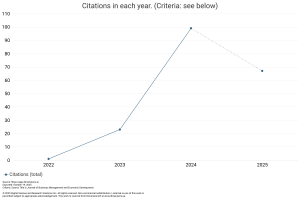Implementation of Integrated Management to Achieve Economic Growth of Wanagriya Tourism Village Ciseeng Bogor: Utilization of Financial Technology, E-Commerce, and HR Development
DOI:
https://doi.org/10.59653/jbmed.v3i02.1466Keywords:
Financial Technology, E-Commerce, HR Development, Integrated ManagementAbstract
This research aims to find out how to utilize Financial Technology, E-commerce, and HR development in an integrated manner to achieve economic growth in the Wana Griya Ciseeng Bogor Tourism Village. This research is an associative causal analysis that analyzes the concept of the relationship between the independent variable and the dependent variable in describing an integrated analysis concept, so this type of research is included in the combined/mixed qualitative and quantitative research method with analysis techniques using the analytical hierarchy process (AHP) concept using applications. Alpha-Sigma Calculator AHP. This research shows that in the integrated management concept, 3 main variables contribute to the development of the Wana Griya Tourism Village, Ciseeng Bogor. Financial Technology contributes 22.67%, E-commerce contributes 29.29%, and HR Development contributes 48.03% in the Integrated Management concept.
Downloads
References
Ana, T. R. C. Y., Saifuddin, M., Hilmi, A. F., & A. A. (2021). Sharia fintech in the halal industry system: Theory and practice (1st ed.). Syiah Kuala University Press.
Andriyanto, I. (2018). Strengthening the competitiveness of micro, small and medium enterprises through e-commerce. Journal of Islamic Business and Management, 6(2), 102–115.
Auwalin, I., Qodrunnada, A., Vauzi, R., & Arifah, S. (2022). Impact of decrease in cultural tourism visits on gross regional domestic product of Blitar Regency during the COVID-19 pandemic. Journal of Indonesian Applied Economics, 10(1), 1–7.
Baihaqi, J. (2018). Sharia-based peer-to-peer lending financial technology in Indonesia. Journal of Sharia Economic Law, 1(2), 116–132.
Bank Indonesia. (2017). Bank Indonesia regulation on the implementation of financial technology (PBI No. 19/12/PBI/2017).
BPS. (2022). Statistics of foreign tourist visits in 2021. Central Bureau of Statistics.
Budiyanti. (2019). Efforts to overcome financial technology business. Jurnal Info Pendek, 11(4), 20–31.
Fais, K. (2021). Legal protection for users of information technology-based money lending services. Journal of Law, 13(1), 70–90.
Financial Services Authority. (2016). Regulation No. 76/POJK.07/2016 concerning increasing financial literacy and inclusion in the services sector.
Ghazali, D. S., & Usman, R. (2012). Banking law. Sinar Grafika.
Istiqamah. (2019a). Analysis of online loans by Fintech in civil law studies. Department of Law, Faculty of Sharia and Law, 6(2), 291–306.
Istiqamah. (2019b). Analysis of online loans by Fintech in civil law studies. Journal of Jurisprudence, 6(2), 291–306.
Muzdalifa, I., Rahma, I. A., & Novalia, B. G. (2018). The role of Fintech in increasing financial inclusion in MSMEs in Indonesia (Sharia financial approach). Masharif Al-Syariah: Journal of Economics and Sharia Banking, 3(1), 1–14.
Nafiah, R., & Faih, A. (2019). Analysis of sharia financial technology (Fintech) transactions in the perspective of maqashid sharia. IQTISHADIA: Journal of Islamic Economics & Banking, 5(2), 180–194.
Novinna, V. (2020). Consumer protection from the dissemination of personal data by third parties. Udayana Master Law Journal, 9(1), 92–110.
Sugangga, R., & Sentoso, E. H. (2020). Legal protection for illegal online loan (Pinjol) users. Journal of Law, 1(1), 47–61.
Wahyuni, R. A. E., & Turisno, B. E. (2019). Illegal financial technology practices in the form of online loans reviewed from business ethics. Journal of Indonesian Legal Development, 1(3), 379–391.
Downloads
Published
How to Cite
Issue
Section
License
Copyright (c) 2025 Achmad Ludvy, Rizka Wahyuni Amelia

This work is licensed under a Creative Commons Attribution-ShareAlike 4.0 International License.
Authors who publish with this journal agree to the following terms:
- Authors retain copyright and grant the journal right of first publication with the work simultaneously licensed under a Creative Commons Attribution-ShareAlike that allows others to share the work with an acknowledgement of the work's authorship and initial publication in this journal.
- Authors are able to enter into separate, additional contractual arrangements for the non-exclusive distribution of the journal's published version of the work (e.g., post it to an institutional repository or publish it in a book), with an acknowledgement of its initial publication in this journal.
- Authors are permitted and encouraged to post their work online (e.g., in institutional repositories or on their website) prior to and during the submission process, as it can lead to productive exchanges, as well as earlier and greater citation of published work (See The Effect of Open Access).





























